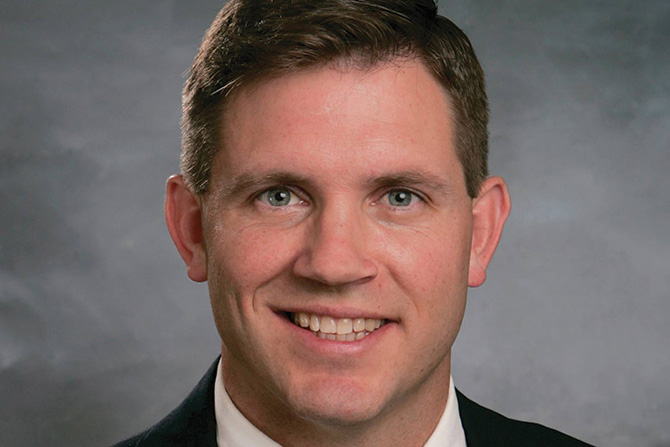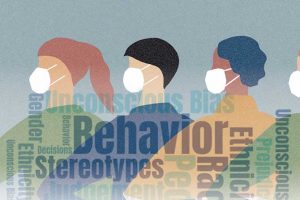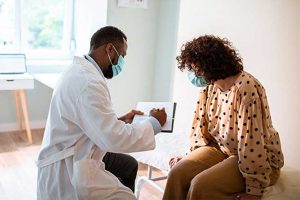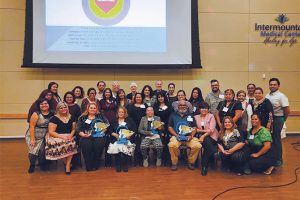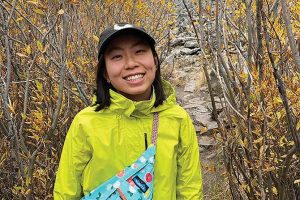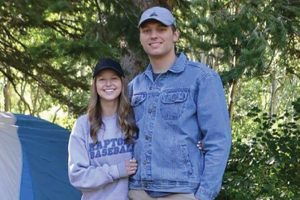By UAFP
As a child growing up in Gainesville, Florida, Marlin Christianson loved to fish. On one occasion, young Marlin caught a fish and went about cleaning it for the family to enjoy for dinner. His father noticed his skill at what some might consider a fairly gruesome task and commented, “You know what, you seem pretty comfortable doing that. You should be a doctor!”
Over the years following that fateful fishing trip, Dr. Christianson had several positive interactions with youth leaders, teachers, and other adults who were physicians whom he admired, furthering his commitment to pursue a career in medicine one day. One of nine children, Marlin’s parents encouraged all of their children to work in professions that would benefit others, and becoming a doctor one day certainly lived up to that ideal. He also came to know several people serving in the military, and it seemed to him that they were having exceptional adventures, traveling the world and learning things. Exploring the world while working as a physician was an ideal combination for Marlin.
Just prior to Marlin beginning high school, his father developed some health issues and had a chance to come back to live and work in his home state of Utah. After graduating from high school in Utah County, Marlin completed his undergraduate at Brigham Young University. Before medical school, he applied for military scholarships that would enable him to combine both opportunities he strove to pursue. As a recipient of a military scholarship from the Navy, he attended medical school at the University of Utah. He then completed his residency training at Camp Pendleton near San Diego, California.
According to Christianson, “The Navy tends to train with a rural emphasis because in the military you may find yourself more isolated without a lot of referral support and other resources. That training fed my love for procedural experience and learning to teach medical procedures, particularly obstetric procedures.” His first assignment post-residency was to a naval station on Guam in the middle of the Pacific Ocean. Guam, an island of only 210 square miles (about the size of Chicago), gave him the experience of working in an isolated community, practicing “old school” family medicine. At the end of the two-year assignment in Guam, Christianson completed a one-year fellowship in complicated obstetrics in Orlando, Florida, which provided the opportunity to learn more advanced procedures. Of course, his family also benefited from the opportunity by purchasing a one-year pass to Walt Disney World!
Christianson assumed after his fellowship that the Navy would send him to a more isolated outpost. Instead, his former residency approached him to return to the Camp Pendleton Family Medicine Residency as a faculty member. Although returning to a place he had already lived did not meet his goal of having new adventures and experiencing new things, teaching at Camp Pendleton turned out to be a fantastic experience.
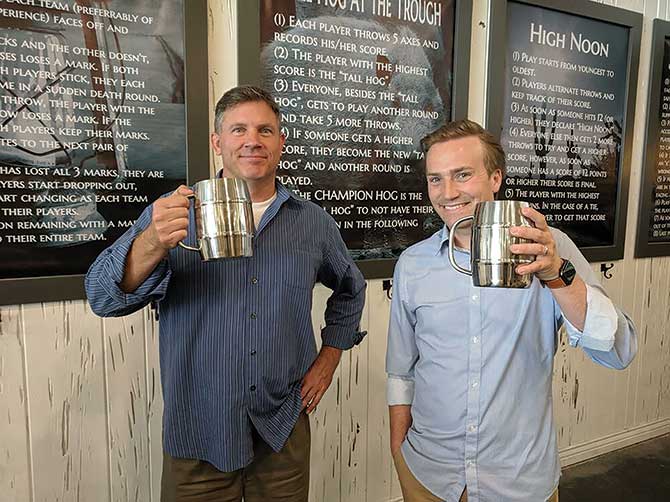
Marlin Christianson and second Year Resident, Danial Payne, M.D. Don’t worry, those steins are full of root beer!
He was fresh from his experience in Guam, followed by the obstetric fellowship that allowed him to share those skills and experience with the residents. After a two-year assignment teaching at the residency, he had fulfilled his military obligations, but he was not quite done having adventures yet.
The next opportunity took Christianson and his family to Naples, Italy, for three years. Although it is a city of 3 million people, the Naval base is still somewhat isolated, so in many ways serving there still felt like a rural rotation and rural experience. As a family physician, he covered the emergency room, delivered babies and ran a full-scope practice. These adventurous assignments were also, once again, beneficial to his family. His children all learned Italian while there, and the family was able to explore Europe during their time there.
At the end of the three years in Italy, it was time to make some family decisions. They had family members back in Utah with ongoing care needs. So, the Christianson family decided it was time to settle down and head home. Christianson called a friend who was a resident at the Utah Valley Family Medicine Residency to inquire about possible job opportunities. The timing was perfect as a faculty member involved in obstetric care was just stepping back. They hoped to find someone with the obstetric and rural medicine experience and family medicine perspective that Christianson possessed. Dr. Christianson decided to fly from Italy to Utah (over a weekend!) to interview for the position. Shortly after arriving home in Italy, he found out he was being offered the Utah Valley job.
After living in California, Guam, and Italy and moving seven times in 11 years, the Christianson family ended up moving into a house just one block away from where a teenage Marlin lived while attending high school. This new location felt like a strange move for a man who regularly sought new adventures. “When we moved back, I didn’t know what it would be like moving forward,” Christianson says. “But being in a residency is a built-in adventure with excitement and a newness every year. Just the fact that we have a class graduating each year and each year we are interviewing brand-new, excited medical students — it really does feel like a new job every year. To see medicine through the residents’ eyes as they are learning things for the first time has kept it very fresh.” Additionally, practicing medicine in a more urban setting has enabled Christianson to continue experiencing a fuller scope of practice, combining the hospital, clinic and teaching. “It’s the best of a full scope rural practice, while in a city,” according to Christianson.
Teaching Residents During a Pandemic
When one seeks out new adventures, those adventures may come in a more challenging form. During a global pandemic, teaching residents could certainly qualify as an “adventure,” albeit an extremely challenging one. However, rather than focusing on the uncertainty and fear staff and residents feel during this time of crisis, Christianson instead emphasizes the energy and focus of the young doctors. “Just coming from the perspective of experience, you realize — in a good way — how innocent and naïve our learners are coming into this and how grateful we are for their dedication to exemplary care. When things feel overwhelming, the impulse can be to step back from challenges and make life easier in stressful times. However, we see our brand-new residents encountering this challenge with great enthusiasm and willingness, in a very safe way, to put themselves in harm’s way to do something meaningful for their patients and their families.” This willingness from residents does not mean that Christianson does not worry about the safety of his colleagues and students. He continually hopes that the information about how best to protect health care providers against contracting the virus is valid and that those providers will be safe, not taking undue risks. “These residents are young, they have young families, and there is always that moment of doubt about how this is really going to play out. Thankfully we have had very little direct difficulties or prolonged illness with the core family of this residency.”
Dr. Christianson has witnessed from the pandemic’s beginning that all of his colleagues at the hospital have rallied to provide the best care possible. “It always seemed like the right thing to do, and I think that was one thing I appreciated; it seemed so natural for them not to want to hide. The care I see provided is inspirational across the board. We have entire hospital areas transformed into pandemic floors.” What Christianson does not want to do is refer to it as “the new normal.” The barrage of daily news and fluctuating numbers is constant, but individuals and families still need routine care. While Christianson, his colleagues, and residents have adjusted to new routines while seeing patients so they can keep everyone as safe as possible — both patients and health care providers — they have also seen a great deal of suffering. And he stresses that this is not a political issue for those providing daily care to patients fighting COVID-19. “We are seeing patients; young patients, pregnant patients and elderly patients suffer from devastating consequences. The reality of it should sweep aside the politics of it. It is affecting people we care about. The politics of it is wiped away when you are dealing with it on the ground.”
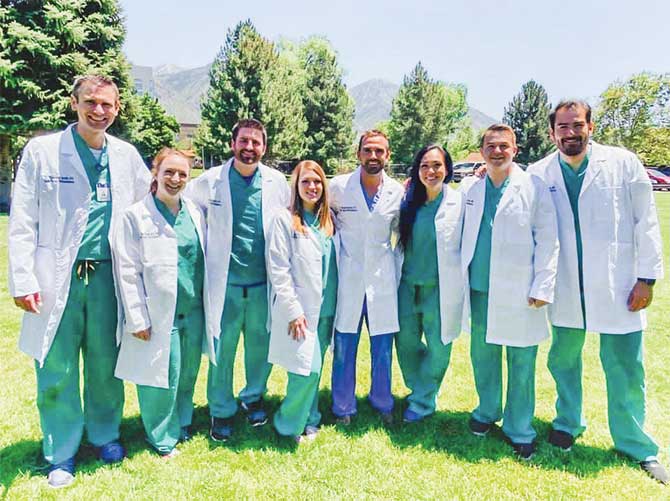
Utah Valley Family Medicine Residency Class of 2023
The Future of Family Medicine and the Need for More Residencies in Utah
With a new college of osteopathic medicine opening in Utah County, Christianson has significant concerns about residency opportunities not expanding in Utah at the same rate as medical schools. He points out the number of medical students we already have leaving to go to other states to complete their residencies when we currently have a shortage of primary care physicians in Utah, particularly in more rural areas. Christianson says, “It leads to the question: what are appropriate services and how do we best provide those for the health of our communities and our nation? I don’t know that there is always great thought that goes into those answers. What is the best way to provide primary care? What is the best way to have teams that do that? There certainly is room for more residency training in Utah and throughout the West because there is a need to have well-trained family physicians who can do great good in their communities.”
Words of Praise for Dr. Christianson from Residents: Past and Present
Dr. Christianson was recently voted to receive the Most Influential Teaching Award by the residents at Utah Valley Family Medicine Residency. We’ve heard from some of the residents who have benefited from his outstanding instruction over the years, and we understand why.
“Marlin began working at the residency when I was just an intern there. He was assigned as my mentor, and now, even 15 years later, he is still filling that role! Marlin has a way of inspiring you to do your best and always put others, especially the patient, first.
“His ability to teach calmly and encouragingly comes through whether he is in the middle of a delivery, a vasectomy, or talking on the phone at 3 a.m. with a difficult patient.
“I remember a time when, as a new second-year resident, Marlin took me aside to talk about my role as a now ‘senior resident’ to the interns. I can still remember the kind words he had as he highlighted the successes and strengths he saw in me as an intern and then challenged me to find ways to instill those characteristics into the new class. On long call nights and busy inpatient weeks, that conversation gave me motivation and strength and pushed me on.
“I still hope, one day, to grow up to be a physician like Dr. Marlin Christianson.”
Mark Wardle, D.O., FAAFP
Assistant Professor of
Family Medicine
Rocky Vista University
“When everyone was having a busy day, and everybody seemed frantic, Marlin was the one who wanted to be interrupted and discuss patient care. Marlin allowed me to play an integral role in every procedure, every patient and every decision throughout the residency. He was always eager to teach and listen. He made the learning environment safe.
“I think regularly — what would Marlin do? He will be inspiring me to be a better physician for years to come.”
Eric Bennett, M.D.
Southeast Idaho Family Practice and Obstetrics
“Marlin embodies every ideal characteristic of a mentor and educator in medicine. He goes above and beyond to care for his patients while cultivating an encouraging and positive learning environment. He constantly offers up his time and skills to allow residents and colleagues to learn from him. He is always approachable and willing to lend a hand or an ear. It is clear that he selflessly prioritizes his role as a physician and as a residency faculty member. He sets an excellent example as a physician and has helped to mold many physicians for the better.”
Bethany Jackson, D.O.
OhioHealth Urgent Care
“One of the things that sticks out to me most about Marlin is his unwavering compassion and focus on what is best for each patient. He has a teaching method that trains us to consider all aspects of the person, not just the presenting issue. His calm and kind manner is obvious not just with his patients but also with the residents.
“He makes himself accessible for our never-ending questions, is patient in his answers, and consistently spends extra time to make sure we are learning as much as we can in a given situation. His confidence in us as residents, and his willingness to teach us new things, make our learning environment richer and more valuable!
“He leads by example in doing whatever needs to be done and doing it with a smile.
“Also, he’s humble. And he’s going to hate that we’re saying these things about him.”
Jessica Fullmer, M.D.
Utah Valley Family
Medicine Residency
Class of 2023
UAFP
This story appears in Issue 2 2020 of the UAFP Journal.

